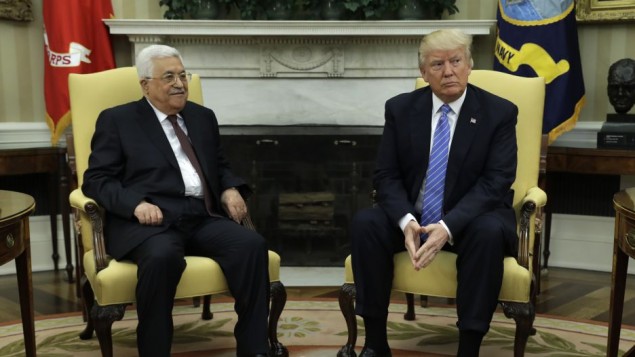In Washington, Abbas offered a strong signal that he would abandon the strategy he pursued in recent years seeking unilateral statehood recognition on the international stage.
By: Ben Cohen, The Algemeiner
At a joint White House press appearance with US President Donald Trump on Wednesday, Palestinian Authority President Mahmoud Abbas — speaking through a translator — indicated that he would no longer favor unilateralism over negotiations.
“Mr. President,” he told Trump, “as far as a permanent solution, we believe that this is possible and able to be resolved…I also believe that we will be able to resolve the issue of the refugees and the issue of the prisoners. According to the international law…and based on what is stipulated in the previous treaties and agreements, that no unilateral steps must be taken to get ahead of the agreement and discussing those issues.”
Earlier on Wednesday, during a conference call organized by The Israel Project, Jonathan Schanzer — a specialist in Palestinian politics at the Foundation for the Defense of Democracies (FDD) think tank in Washington, DC — noted, “The Palestinians appear to have given up on recognition at the UN and at UN agencies to build toward a unilateral independence declaration. That is no longer happening.”
In Schanzer’s view, Abbas’ shift away from unilateralism reflects his determination to retain political power above all other considerations. “Every decision he has made since 2007 (when Abbas’ Fatah faction was violently ousted from the Gaza Strip by Hamas) has been about self-preservation,” Schanzer said.
A Contest of ‘Brinksmanship’ with Netanyahu?
After Trump succeeded Barack Obama in the White House, Schanzer explained, Abbas recognized that the new American president “needs him if he’s going to be successful.”
“Abbas wasn’t interested in doing this in the least under Obama,” Schanzer remarked. But now, he said, Abbas has embarked on a contest of “brinksmanship” with Israeli Prime Minister Benjamin Netanyahu. Since Palestinian cooperation with Trump would put additional pressure on the Israeli leader, Schanzer pointed out, “Abbas has little to lose.”
On the same conference call, Grant Rumley — a FDD research fellow — highlighted the role Trump’s Middle East envoy Jason Greenblatt played in reaching out to the Palestinians in the months prior to the Abbas’ current DC visit.
Rumley said that Greenblatt’s recent meeting with Arab businessmen in Jerusalem’s Old City boosted Palestinian confidence in Trump. “The symbolic nature of the president’s top Middle East guy engaging like this was a great sign for them,” Rumley said.
Having seen the positive meetings between Trump and other Arab leaders — including Egyptian President Abdel Fattah el-Sisi — Abbas understood that “this is a president that resonates with strong leaders and connects more with honey rather than vinegar,” Rumley stated.
The Big Issues: Incitement and Terrorism
But whether Abbas can satisfy Trump on issues like incitement and terrorism, which were featured prominently in the president’s remarks at Wednesday’s White House event, remains an open question. Not the least of Abbas’ problems, according to Rumley, is his low popularity among Palestinians.
This contrasts sharply with Marwan Barghouti — the Fatah terrorist leader jailed in Israel who is now leading a hunger strike that has entered its third week.
“Marwan is hands down the most popular figure in Palestinian society right now,” Rumley observed.
